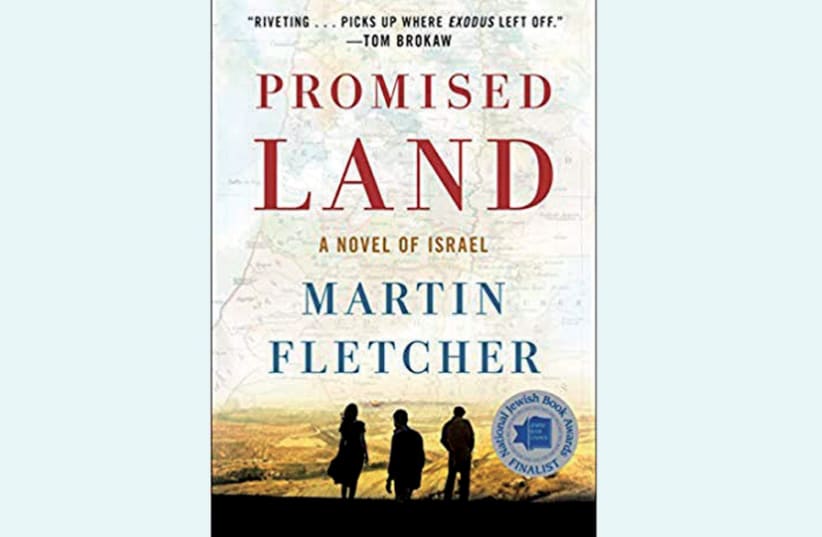As the nascent state of Israel struggles through its tumultuous early years, two brothers, separated by the Second World War, come together and pursue very different paths in life. Each in his own way is contributing to the development of the emerging country, yet their close relationship is tested to its limit when they come to love the same woman, Tamara.
Promised Land covers a period of 30 years – from Germany of 1937 to just after the Six Day War. With life in Nazi Germany becoming intolerable for Jews, 13-year-old Peter Berg is allocated a passage to the United States. Separated from his parents, from his brother, Arie, and his sisters, Renata and Ruth, he goes to live with a gentile family in Wisconsin. Meanwhile at the end of 1941, the Bergs, trapped in Munich, are rounded up, and Arie is transported to Auschwitz.
Just a year younger than Peter, Arie survives on account of his youth, strength and rapidly acquired skill as a boxer. For entertainment, the SS guards would arrange boxing matches between the prisoners, and bet on the outcome. Losers were sent to the gas chamber or simply shot where they lay; winners were given extra food and made to fight again. Arie kept winning.
“They didn’t let us stop until there was blood,” Arie confesses at one time to Tamara. “A lot of it. I don’t know how many I beat. But it was them or me.”
Treated by the Nazi guards like a champion gladiator, he came to be hated by other prisoners – but he survived. After the war he made his way to Israel, guilt-ridden by the knowledge of how he had managed to stay alive.
Peter, meanwhile, having enlisted in the American army, fought his way through Europe and was among the first units to liberate Dachau. His fluent German led to an appointment with the OSS – the Office of Strategic Services, America’s wartime intelligence agency. When it later became the CIA, Peter moved into the new security organization as one of their agents.
It was here that he caught the eye of Israel’s security chief, who persuaded him that his services would be invaluable to the Jewish state. So while Peter becomes involved in secret intelligence and security missions around the world, Arie discovers latent entrepreneurial skills and makes a fortune by exploiting the many business opportunities available in a rapidly developing country.
As the State of Israel is declared, Tamara and her family, long settled in Egypt, flee to an Israel where the European Ashkenazi Jews represent the establishment. They find themselves in the squalid and inadequate temporary shelter provided for the refugees from Arab lands, but it is here that Tamara meets Arie and then Peter, and the plot takes off.
Because of Peter’s long and unexplained absences on his secret assignments, and despite her innermost feelings, Tamara marries Arie. Peter also marries, but he is unable to cast off his attraction for Tamara. Circumstances eventually provide a way through the maze.
Promised Land delivers for readers on two levels. It tells the absorbing story of three individuals – Peter, Arie and Tamara – as they slowly discover themselves and their place in the environment of an emerging nation. At the same time, the backdrop to their stories – Israel’s unfolding history – is recounted with total accuracy, and affords a view of historical events from an unusual perspective.
Few people are more qualified to provide this than British-born Martin Fletcher. An award-winning former NBC News Middle East correspondent who was Tel Aviv bureau chief for many years, Fletcher is among the longest-serving foreign correspondents in Israel.
The saga ends with Israel’s triumph in the Six Day War, and for the brothers, the unexpected return of their sister, Renata, the only member of the Berg family to survive the horrors of the Riga ghetto and the Kaiserwald concentration camp. Stuck behind the Iron Curtain when the war ended, she finally managed to escape, make her way to England and from there to Israel.
The wholly convincing interweaving of fiction with historical fact makes Promised Land a compulsive read, and we are left wondering about how life pans out for the main characters in the years after the Six Day War. Israel’s history in the succeeding half-century certainly provides enough by way of background to whet the appetite and feed the imagination.
Martin Fletcher, having taken us with him thus far, must surely have a sequel in mind, or possibly two.
